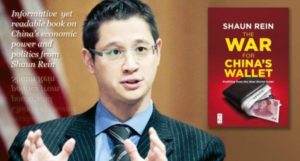
Chinese brands like Huawei and Xiaomi have not only legal problems to enter the lucrative US market, says business analyst Shaun Rein, author of The War for China’s Wallet: Profiting from the New World Order. It would also help if potential buyers would be able to pronounce the name of the product they are expected to purchase, he tells the South China Morning Post.
The South China Morning Post:
Huawei isn’t alone. Xiaomi, aiming to revolutionise China’s consumer electronics along the style of Apple, is almost impossible to pronounce. Xiaomi literally means “little rice.”
Or take Tsingtao Beer, arguably the most internationalised among China’s brewers, its distinctive green bottle often the only Chinese brand found anywhere outside mainland China. Its name, spelt in the Wade-Giles system for romanising Mandarin, is the name of its home base of Qingdao city in Shandong province.
Chinese brands need to be “something that roll off the tongue easily” to succeed, said Shaun Rein, founder and managing director of the China Market Research Group in Shanghai. Names like Huawei or Xiaomi, which “haven’t created English names that Americans and western Europeans can memorise or pronounce easily” have a bigger problem breaking into the market, he said.
Americans spent US$14,564 per person on retail spending in 2014, more than three times the per-capita spending by Chinese consumers in the same year. That underscores the attraction of the consumer market in the planet’s biggest economy, even if its population is a quarter of China’s size…
There are exceptions. DJI, the world’s largest producer of recreational drones, is headquartered in Shenzhen in southern China. Its full name, spelt out, is Da Jiang Innovations, inspired by the Chinese adage “Great ambition has no boundaries”.
But the company rarely goes by its full name in English, preferring to obscure its origins. It has an estimated 75 per cent share of the world’s market for drones, with the US among its biggest market.
“American consumers sees DJI and they don’t know its heritage,” said Rein. “DJI is easily memorised by Americans and I think that’s the reason why Alibaba and Tencent do reasonably well, at least in recognition by Americans investors. Because their English names are easily memorable.”
More in the South China Morning Post.
Shaun Rein is a speaker at the China Speakers Bureau. Do you need him at your meeting or conference? Do get in touch or fill in our speakers’ request form.
Are you looking for more strategic advisors at the China Speakers Bureau? Do check out this list.
